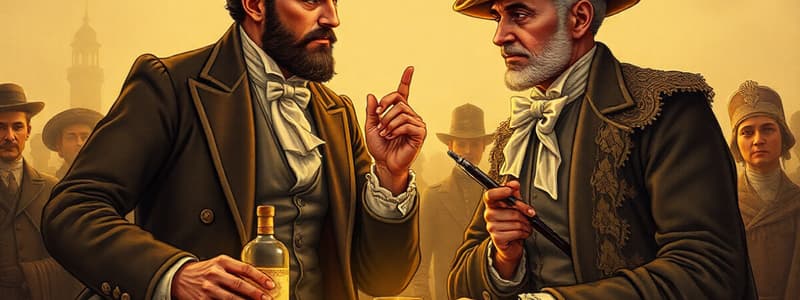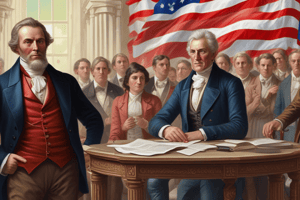Podcast
Questions and Answers
What was the primary motivation behind William Lloyd Garrison's activism?
What was the primary motivation behind William Lloyd Garrison's activism?
- To achieve immediate abolishment of slavery (correct)
- To support Jacksonian Democracy
- To promote temperance and reduce alcohol consumption
- To advocate for states’ rights and nullification
Which event was characterized as a corrupt bargain in the context of the 1824 election?
Which event was characterized as a corrupt bargain in the context of the 1824 election?
- Jackson's opposition to the Second Bank
- John C. Calhoun's resignation from the vice presidency
- The outcome of the Erie Canal construction
- The appointment of Henry Clay as Secretary of State (correct)
What societal changes were primarily driven by urbanization in the 19th century?
What societal changes were primarily driven by urbanization in the 19th century?
- Migration from rural areas to industrial cities for economic opportunities (correct)
- A movement away from democracy towards autocracy
- An increase in rural population due to industrial relocation
- A decline in church membership and religious influence
How did the Second Great Awakening influence American society?
How did the Second Great Awakening influence American society?
What was the primary purpose of temperance movements in the 19th century?
What was the primary purpose of temperance movements in the 19th century?
What does the term 'Pet Banks' refer to in U.S. history?
What does the term 'Pet Banks' refer to in U.S. history?
Which literary and artistic movement is characterized by a strong emphasis on individual emotion and imagination?
Which literary and artistic movement is characterized by a strong emphasis on individual emotion and imagination?
What was one significant effect of the construction of the Erie Canal?
What was one significant effect of the construction of the Erie Canal?
Flashcards are hidden until you start studying
Study Notes
The Corrupt Bargain
- In the 1824 election, Andrew Jackson won the popular vote but did not secure a majority of the electoral votes.
- The election was thrown to the House of Representatives.
- John Quincy Adams won the presidency after a deal with Henry Clay, who became Secretary of State.
- This deal, known as the "Corrupt Bargain," was controversial and fueled Jackson's resentment towards Adams and the political establishment.
John C. Calhoun
- A prominent Southern politician who strongly advocated for states' rights.
- Believed in the concept of nullification, where states could veto federal laws they deemed unconstitutional.
- Championed states' rights in relation to protecting the institution of slavery.
William Lloyd Garrison
- A fervent abolitionist who believed in the immediate abolition of slavery.
- Published the newspaper The Liberator, which strongly criticized slavery and called for its immediate end.
- Garrison was a leading figure in the burgeoning abolitionist movement.
Abolitionism
- A movement to end slavery, gaining momentum in the mid-19th century.
- Abolitionists like Garrison used moral arguments, religious appeals, and political pressure to challenge slavery.
- The movement faced strong opposition from slaveholders and those who defended the economic and social system built on slavery.
Temperance
- A social reform movement promoting moderation or abstinence from alcohol consumption.
- Motivations often stemmed from religious beliefs and concerns about the negative societal impacts of excessive drinking.
- Temperance societies played a significant role in shaping public opinion and enacting policies related to alcohol consumption.
Urbanization
- The process of people moving from rural areas to cities.
- This shift was driven by industrialization and economic opportunities in urban centers.
- Urbanization led to significant population increases in cities and reshaped the social and economic landscape of the United States.
Second Great Awakening Effects
- A period of intense religious revivalism that significantly increased church membership.
- Sparked social reform movements such as abolitionism and women's rights.
- Empowered women to take on more prominent roles within religious communities.
Pet Banks
- Term for state-chartered banks favored by President Andrew Jackson.
- Jackson deposited federal funds in these banks after vetoing the recharter of the Second Bank of the United States.
- The term "Pet Banks" was used by opponents of Jackson to criticize his favoritism and the perceived corruption of the system.
Romanticism
- A literary and artistic movement emphasizing emotions, imagination, and the beauty of nature.
- Rejected the Enlightenment's emphasis on reason and rationalism.
- Romanticism contributed to a shift in cultural values and artistic expressions, influencing literature, music, and painting.
Jacksonian Democracy
- A political movement associated with President Andrew Jackson.
- Advocated for expanding democracy and increasing the power of the common man in government.
- This movement challenged the political elite and sought to promote the interests of the working class and farmers.
Erie Canal
- A historic canal built in New York connecting the Hudson River to Lake Erie.
- It facilitated westward expansion and trade by drastically reducing transportation costs between the East Coast and the Midwest.
- The Erie Canal became a symbol of American ingenuity and its ability to shape the nation's infrastructure and economic development.
Studying That Suits You
Use AI to generate personalized quizzes and flashcards to suit your learning preferences.




